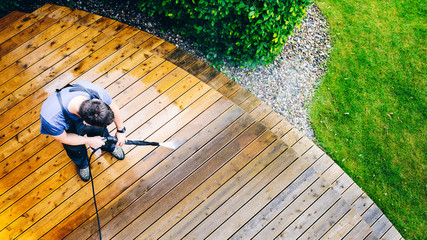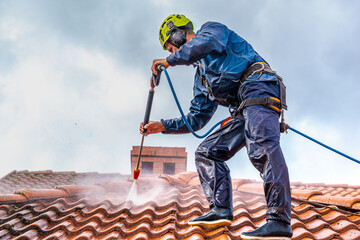Basics of Pressure Washing

It may be time for a pressure wash when mildew, mold, dirt, and tar build up on a house’s siding or outdoor furnishings. The right nozzle quickly cleans surfaces, but care is needed to avoid damage. Before starting, shut off electricity to exterior outlets and cover light fixtures, doorbells, transformer boxes, backup generator cabinets, and cameras.

A pressure washer is a machine that creates high-pressure water spray used to clean outdoor surfaces such as driveways, sidewalks, and patios. They are powered by a gas or electric motor that accelerates the water in a pump and then shoots it out of a nozzle at high speed. These machines can reach up to 4,000 PSI and be extremely dangerous for inexperienced users, so hiring a professional Summerville Roof Cleaning is best.
When you’re cleaning a surface with a pressure washer, you’re using water at high kinetic energy to blast away dirt and grime. The force of this high-pressure water spray can damage surfaces if you’re not careful. That’s why using a pressure washer with the right PSI (Pounds Per Square Inch) and GPM (Gallons Per Minute) is important. This way you can be sure that you’re not using more power than is necessary to get the job done.
The difference between a power washer and a standard washer is that a power washing machine will heat the water that comes out of the nozzle. This allows the water to break down grease, blackened surfaces, and other stuck-on substances more effectively. It also allows the water to penetrate deeper into cracks and crevices, allowing it to clean the areas that are typically missed by regular cleaning methods.
On the other hand, a standard washer will not heat the water that comes out of the hose and instead only uses the force of the high-pressure water to clean surfaces. This method is less damaging to surfaces and is the preferred choice for most household applications.
Both power and standard washers can dispense cleaner from a tank or bucket, which helps them to clean more thoroughly than just using the high-pressure water alone. If you’re using a pressure washer to clean your home, be sure to choose a day with mild temperatures and no direct sunlight. This will help prevent your detergents from drying out before you have a chance to rinse them away. And don’t forget to wear rubber gloves and eye protection when operating a pressure washer!
Water
When used correctly, hot water pressure washing machines can remove all sorts of debris. Unlike the low-pressure spray of regular water hoses, these high-powered machines deliver a powerful blast of hot, pressurized water that can melt away dirt and grime, including stubborn materials like bird droppings and spray paint.
When combined with a detergent, pressure washers can also eliminate oil and grease deposits. This is because the chemicals in a detergent break down the bonds between oil and surfaces. Then, when the pressure washer blasts these surfaces, the oil and grease are carried away with the water.
Pressure washing is also easy on the environment. Traditional cleaning solutions enact a heavy toll on the environment, but pressure washers use only water at high velocity, so they don’t release any pollutants into the air. Furthermore, many professional cleaning services will only use a detergent, instead of harmful cleaners, to blast away grime and lift stains.
Aside from its environmental benefits, pressure washing is also effective at removing mildew and mold. This can help to keep your family healthy, especially if someone in the household has asthma or other breathing issues. In addition, a dirty home can attract pests like termites and ants, so regular cleaning with a pressure washer can minimize these threats.
Lastly, pressure washing can be very useful before painting projects. It can help to remove any loose flakes or peeling paint that might otherwise bleed through the new coat of paint. Likewise, it can also remove any lingering contaminants that might affect the quality of the paint job.
The bottom line is that a clean, well-maintained exterior can dramatically boost your property’s value and curb appeal. It can also provide a sense of pride for your family and can make your neighbors envy your beautiful home. So if your house or business is in desperate need of a thorough cleaning, don’t hesitate to call a professional pressure washing company for a deep clean. They’ll get your home or business looking brand new in no time! Then you can relax and enjoy your beautiful outdoor spaces.
Chemicals
Pressure washing is a modern cleaning method that uses the power of water to remove dirt, grime, mildew, and even mold from surfaces. Many businesses use it to clean cars, homes, and outdoor spaces like porches, patios, decks, and driveways. It’s a great way to boost curb appeal and improve the value of your home or commercial property.
In addition to high-pressure water, most professional cleaners use chemicals as part of their cleaning process. These chemicals are designed to work in tandem with the water to remove stubborn deposits and staining. Some of the most common chemicals used in this process include oxalic acid, sodium hydroxide (lye), bleach, and sodium hypochlorite. These are highly-effective in removing stains, degreasing metals, dissolving grease, and sanitizing and disinfecting.
Oxalic acid is a non-corrosive, naturally occurring chemical that can help to remove rust from concrete or wood. It’s also effective in the removal of hard water marks and mineral stains. It’s commonly used in conjunction with other chemicals to make the cleaning process faster and more effective.
Sodium hydroxide is another common chemical used during the pressure washing process. It’s a strong degreaser and works well on glass and steel. It’s also a powerful sanitizer that works well for removing and preventing mold and mildew.
Bleach is an alkaline chemical that can be very effective at sanitizing and disinfecting. However, it’s best to avoid using it on metals or porous woods as it can be very abrasive. It’s important to dilute any bleach or detergent products before using them on your surfaces.
Lastly, some cleaning companies use sodium hypochlorite to kill any bacteria or germs that may be growing on your surfaces. It’s very effective at killing a wide variety of bacteria and germs, including salmonella, E.coli, rotavirus, and influenza viruses.
Regular professional pressure washing can help to improve your home’s air quality by removing dirt, pollen, and other allergens from the surface of your buildings. It can also reduce the risk of slips and falls by removing slippery substances such as algae or mildew. It can also increase the value of your home by reducing the amount of time you spend on maintenance and improving your home’s curb appeal.
Safety
Pressure washers emit high-pressure water, which means they can cause severe injuries if they come into contact with your skin. Even a small cut from a pressure washer can be dangerous because it may not bleed, and chemicals from the machine can get directly into your bloodstream.
In addition to cuts, the force of the water can damage surfaces with too much pressure. For example, if you try to clean siding with too much pressure, you could crack the surface of the house or strip paint off your home’s exterior. If you’re worried about damaging your surfaces, you can soft wash them instead.
Using a pressure washer requires safety measures like eye protection, rubber gloves, and boots or shoes with insulation. You should also keep children and pets away from the area while you’re spraying. Only adults should operate the pressure washer, and it should never be used indoors. If you’re concerned that the unit might trip a circuit breaker, have a qualified electrician check it before continuing to use it.
The power of the spray can easily knock over or damage furniture, outdoor decorations, and other items in your yard. If you’re washing larger items, such as vehicles or plant pots, make sure they are leaning against something stable, and keep them out of the direct path of the stream of water.
A high-powered stream of water can dent cars, shatter glass windows, and destroy the structural integrity of wood. It can also be dangerous if the stream of water hits you or someone else. To avoid this, you should always wear a pair of safety glasses and earplugs while you’re pressure washing.
It’s important to read the manual for the pressure washer you’re using before you begin. The manual will explain how the machine operates and how to prevent damage. If you don’t follow the instructions, you could accidentally start a fire or get seriously injured.
When you’re finished with your project, it’s essential to turn off the pressure washer. It’s best to do this at the spigot, but you can also shut off the power switch on the unit itself.
